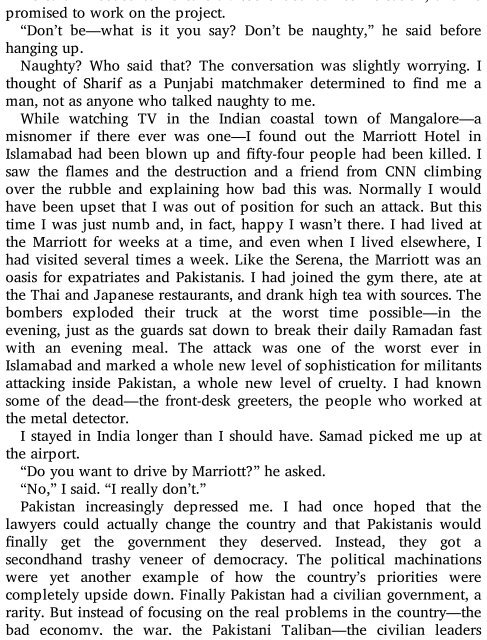the_taliban_shuffle_-_kim_barker
the_taliban_shuffle_-_kim_barker
the_taliban_shuffle_-_kim_barker
Create successful ePaper yourself
Turn your PDF publications into a flip-book with our unique Google optimized e-Paper software.
promised to work on <strong>the</strong> project.<br />
“Don’t be—what is it you say? Don’t be naughty,” he said before<br />
hanging up.<br />
Naughty? Who said that? The conversation was slightly worrying. I<br />
thought of Sharif as a Punjabi matchmaker determined to nd me a<br />
man, not as anyone who talked naughty to me.<br />
While watching TV in <strong>the</strong> Indian coastal town of Mangalore—a<br />
misnomer if <strong>the</strong>re ever was one—I found out <strong>the</strong> Marriott Hotel in<br />
Islamabad had been blown up and fty-four people had been killed. I<br />
saw <strong>the</strong> ames and <strong>the</strong> destruction and a friend from CNN climbing<br />
over <strong>the</strong> rubble and explaining how bad this was. Normally I would<br />
have been upset that I was out of position for such an attack. But this<br />
time I was just numb and, in fact, happy I wasn’t <strong>the</strong>re. I had lived at<br />
<strong>the</strong> Marriott for weeks at a time, and even when I lived elsewhere, I<br />
had visited several times a week. Like <strong>the</strong> Serena, <strong>the</strong> Marriott was an<br />
oasis for expatriates and Pakistanis. I had joined <strong>the</strong> gym <strong>the</strong>re, ate at<br />
<strong>the</strong> Thai and Japanese restaurants, and drank high tea with sources. The<br />
bombers exploded <strong>the</strong>ir truck at <strong>the</strong> worst time possible—in <strong>the</strong><br />
evening, just as <strong>the</strong> guards sat down to break <strong>the</strong>ir daily Ramadan fast<br />
with an evening meal. The attack was one of <strong>the</strong> worst ever in<br />
Islamabad and marked a whole new level of sophistication for militants<br />
attacking inside Pakistan, a whole new level of cruelty. I had known<br />
some of <strong>the</strong> dead—<strong>the</strong> front-desk greeters, <strong>the</strong> people who worked at<br />
<strong>the</strong> metal detector.<br />
I stayed in India longer than I should have. Samad picked me up at<br />
<strong>the</strong> airport.<br />
“Do you want to drive by Marriott?” he asked.<br />
“No,” I said. “I really don’t.”<br />
Pakistan increasingly depressed me. I had once hoped that <strong>the</strong><br />
lawyers could actually change <strong>the</strong> country and that Pakistanis would<br />
nally get <strong>the</strong> government <strong>the</strong>y deserved. Instead, <strong>the</strong>y got a<br />
secondhand trashy veneer of democracy. The political machinations<br />
were yet ano<strong>the</strong>r example of how <strong>the</strong> country’s priorities were<br />
completely upside down. Finally Pakistan had a civilian government, a<br />
rarity. But instead of focusing on <strong>the</strong> real problems in <strong>the</strong> country—<strong>the</strong><br />
bad economy, <strong>the</strong> war, <strong>the</strong> Pakistani Taliban—<strong>the</strong> civilian leaders



